Politics-as-normal was suspended when the COVID-19 crisis began and BfS decided to suspend its campaigning as well. However, recently Unionist politicians have been trying to politicise the coronavirus crisis especially now with the Scottish and Westminster governments diverging on the speed of exit from lockdown. We thought that was unwise, especially given the well documented public opinion on the gap in credibility and performance between the Scottish First Minister Nicola Sturgeon MSP and the omnishambles of Westminster’s mixed messages.
To see if we were correct we added a question to a poll being run by Panelbase to see if there had been progress in support for independence since the last poll carried out three weeks ago.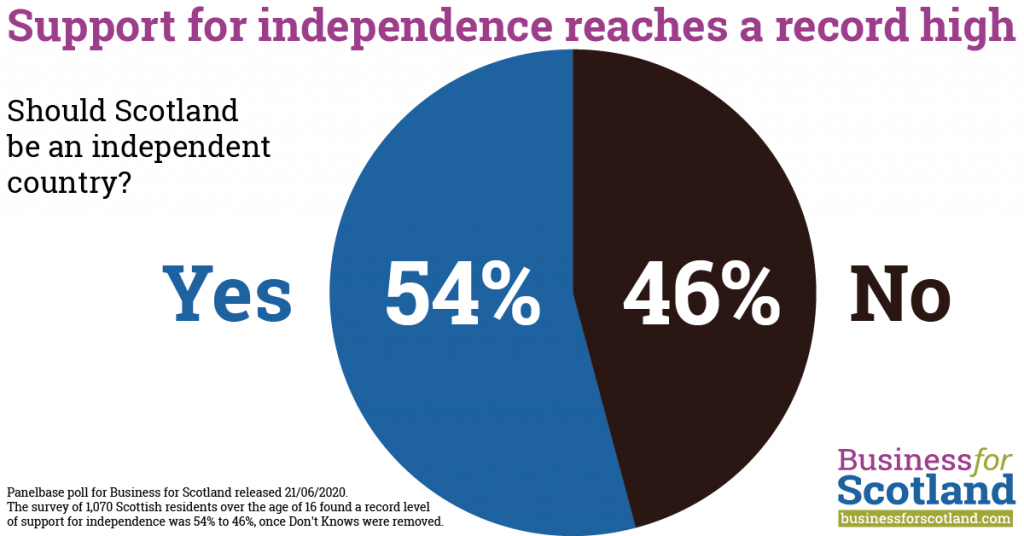
The poll results
Our poll found support for Scottish independence at a record 54% and that follows hard on the heels of a Panelbase poll of two weeks ago, showing independence support at 52%.
The survey of 1,070 Scottish residents over the age of 16 found support for independence was 54% to 46%, once Don’t Knows were removed.
When you include undecided voters, support for independence is leading by 50% to 43%, with 7% of Don’t Knows. This relates to a stunning 338,000 additional Yes voters compared to 2014, assuming similar turnout levels.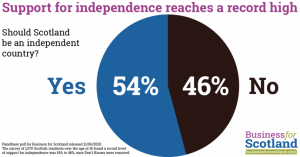 The Breakdown
The Breakdown
The poll found that male respondents would support independence by 58% to 42% and females were still marginally in favour of the union by 51% to 49%.
The unionist lead in female voters is dependent on age, with females aged between 15 and 34 supporting independence by a massive 73% to 27%. That was higher than the equivalent age group for men, where independence led by 68% to 32%.
Indeed the unionist vote relies on three key groups; firstly males and females over the age of 55 where the union still leads 57% to 43%, females over the age of 55 where the union leads 61% to 39% and Conservative voters.
Please note: A more recent Panelbase poll for The Sunday Times two weeks after or poll confirmed the 54% Yes figure, proving this is not a rogue poll.
Party allegiances
The poll also identified political party allegiances from the December 2019 General Election and found that 37% of Labour voters would now vote for Scottish independence in a new referendum. 13% of GE2019 Labour voters were also undecided on independence and so, within the ranks of Labour party supporters in Scotland, support for the union is 50% – hardly a great advert for the party whose leaders in Scotland would expect to head up the Unionist campaign.
In the Panelbase poll – carried out between 1st and 5th of June for polling blog ScotGoesPop Labour – voters’ support for independence was only 35% and so these polls considered together indicate a growing trend of lost support for Westminster governance amongst Labour voters.
In between these two polls the Scottish Labour leader Richard Leonard MSP hardened Labour’s stance on a second independence referendum after claims the party had a confused policy. Future polls will paint a clearer picture, but this may suggest that its leader’s fundamentalist stance against a second referendum is driving voters away from the party and into the arms of the Yes movement.
The independence question was part of a syndicated poll carried out in unison with another organisation’s survey on people’s attitudes to the wellbeing approach in economics. That wellbeing approach is supported by Scotland’s First Minister and so if future polls were to suggest that combination influenced some voters to move to Yes that would still be very good news for the Yes movement.
Conservative voters were the most unionist with 94% supporting the union and only 6% sporting independence – that contrasts with SNP voters who were 92% Yes and 8% No.
So few Lib Dem voters could be found that it’s difficult to know how accurate the figures are, but as many as 16% of LibDems indicated they would support independence.
The 2020 trend in poll results
Our poll was the fifth Panelbase poll to ask the independence question in 2020, since then the Sunday Times have run another poll by Panelbase and that also found 54% and therefore confirmed the accuracy of our poll. Those polls have now found support for independence to be 52%, 49%, 50%, 52% and 54% and 54% that would seem to suggest the momentum is now with the independence movement leaving the 2020 average at 52% and the average of the last 3 polls (June and July) is 53%.
BfS chairman Rob Aberdein comments:
“In the two weeks since the last poll, we have had Labour hardening its opposition to a second referendum; the Scottish First Minister being seen as a safe pair of hands on the Scottish Government’s Covid-19 response compared to Westminster’s response; the Conservatives in Scotland trying to force the First Minister to open up the economy more quickly than the First Minister believes is safe;- Sir Billy Connolly one of Scotland’s most iconic celebrities – threw his weight behind the cause of Scottish independence, insisting the prospect of the country becoming a republic is “as good an idea as any I’ve ever heard”; and we have also had Loyalist/British nationalist protests in Glasgow resulting in violent clashes with the police.
“Given what has been going on if there wasn’t a positive move in the poll on independence support it would possibly have been surprising. 54% is the highest level of support registered by a BPC member polling company since the unsustained spike (54% Survation 26/06/2016) that followed the immediate aftermath of the Brexit vote in 2016.
“This and other recent polls are showing that independence support is gaining momentum. With the end of June deadline approaching for the UK Government to agree an extension to the Brexit transition period, it may be that those who considered independence more favourably immediately following the Brexit vote may come back help to maintain that independence momentum, as a hard Brexit becomes more of a realistic prospect in voters’ minds.”
Notes
As is standard practice the results of the survey were weighted by both the 2019 Westminster vote and the 2014 independence referendum vote. Panelbase is a Market Research Society Company Partner and undertakes all research in accordance with the MRS Code of Conduct and to ESOMAR guidelines.
The question asked was: How would you vote in response to the question: Should Scotland be an independent country? Those not likely to vote were excluded and the result was:

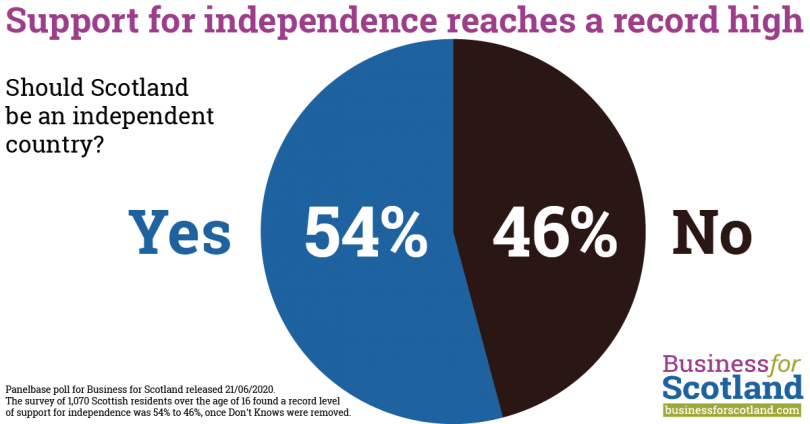
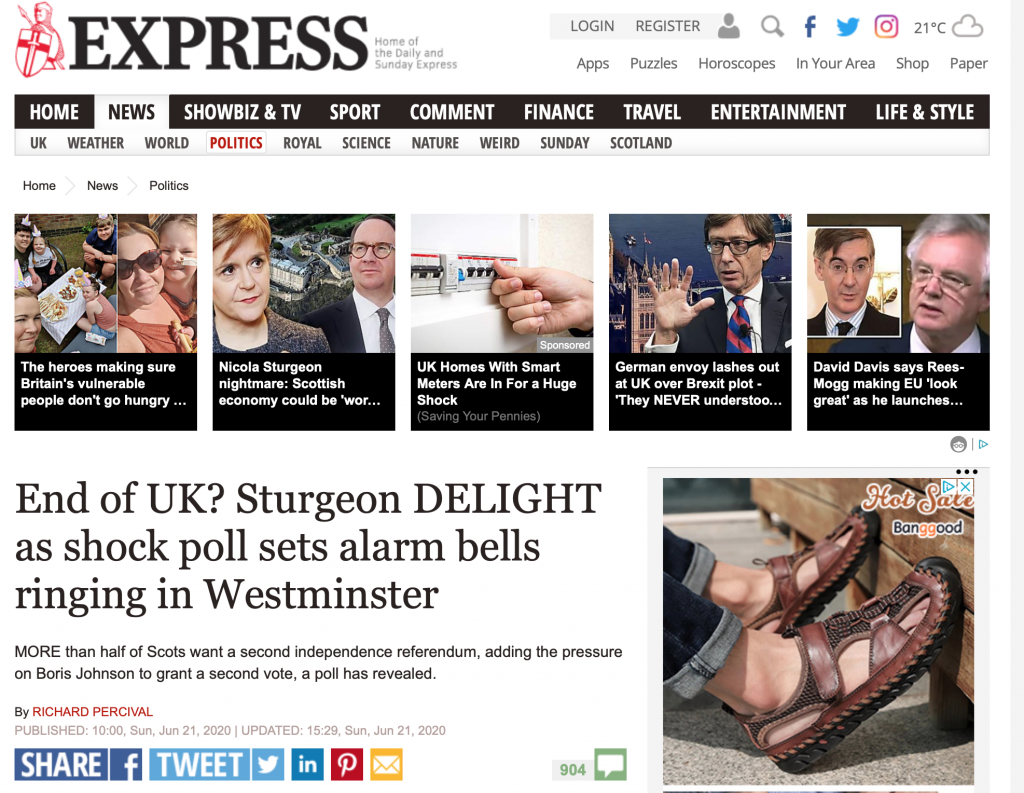

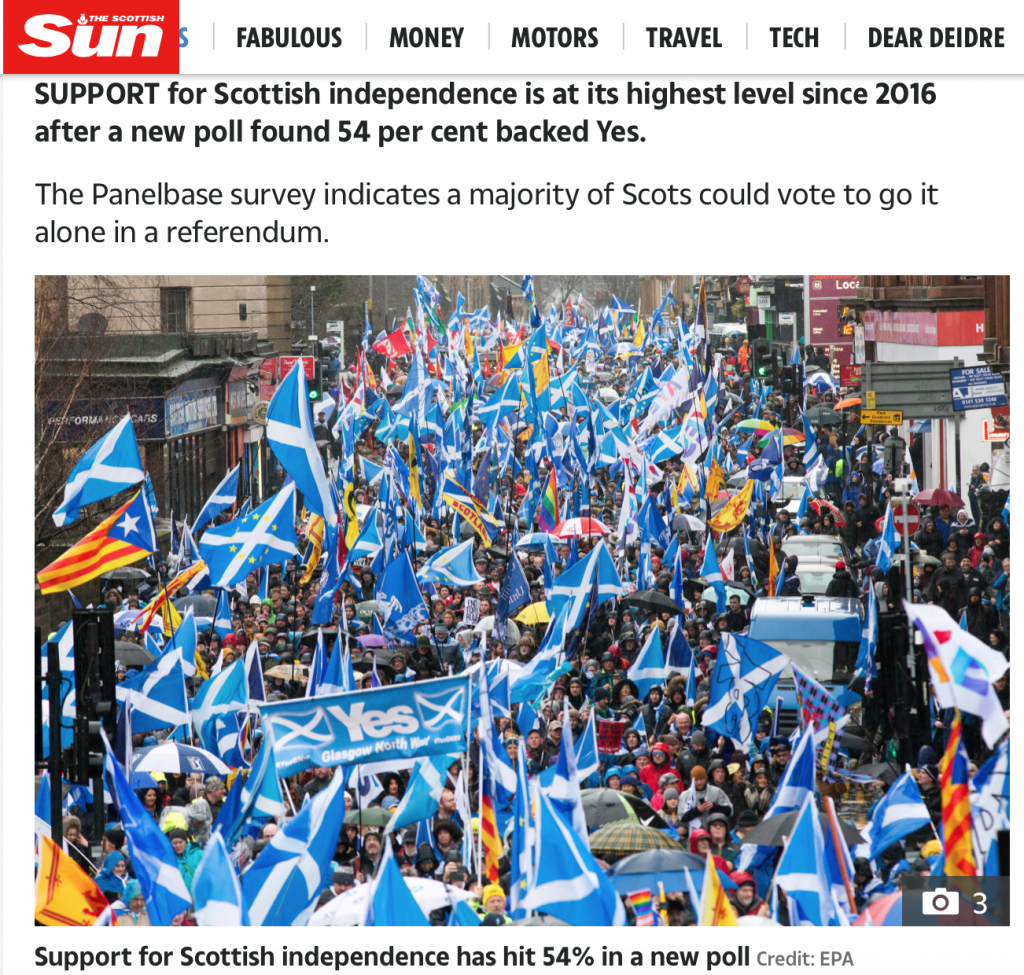
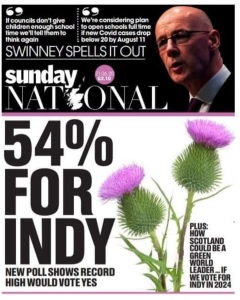
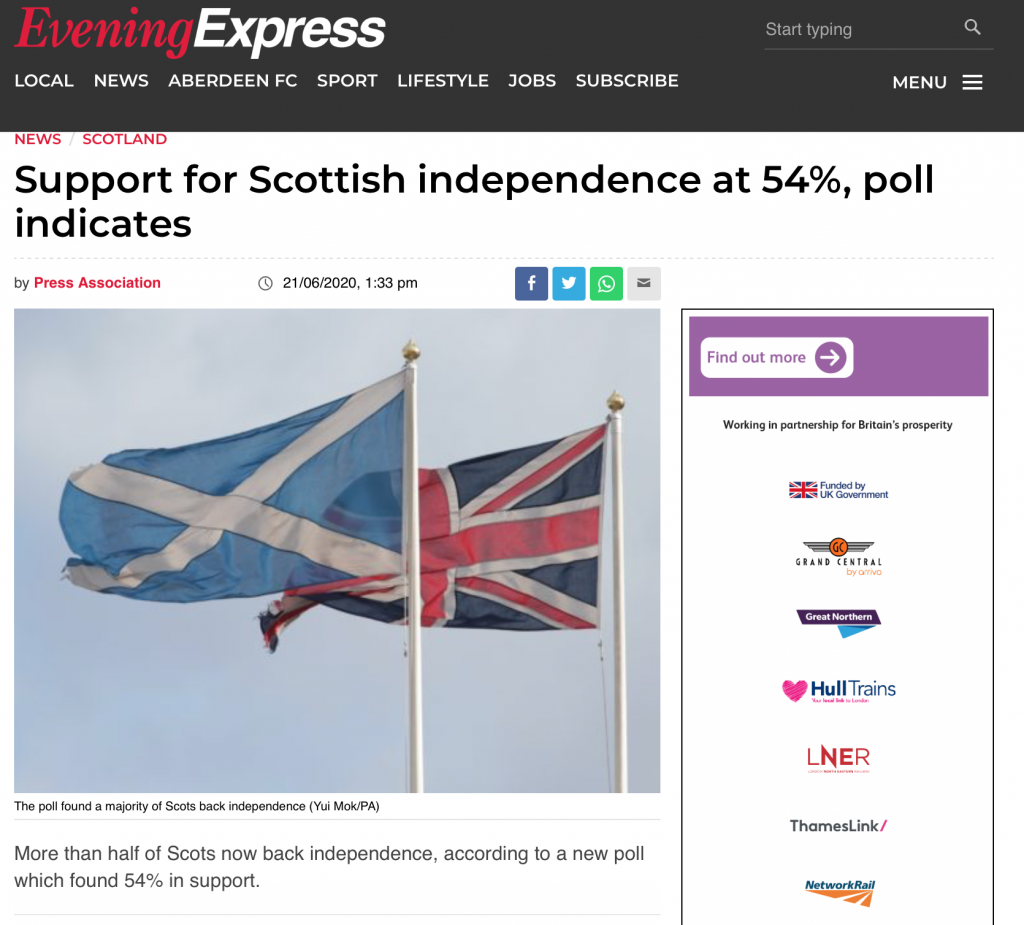
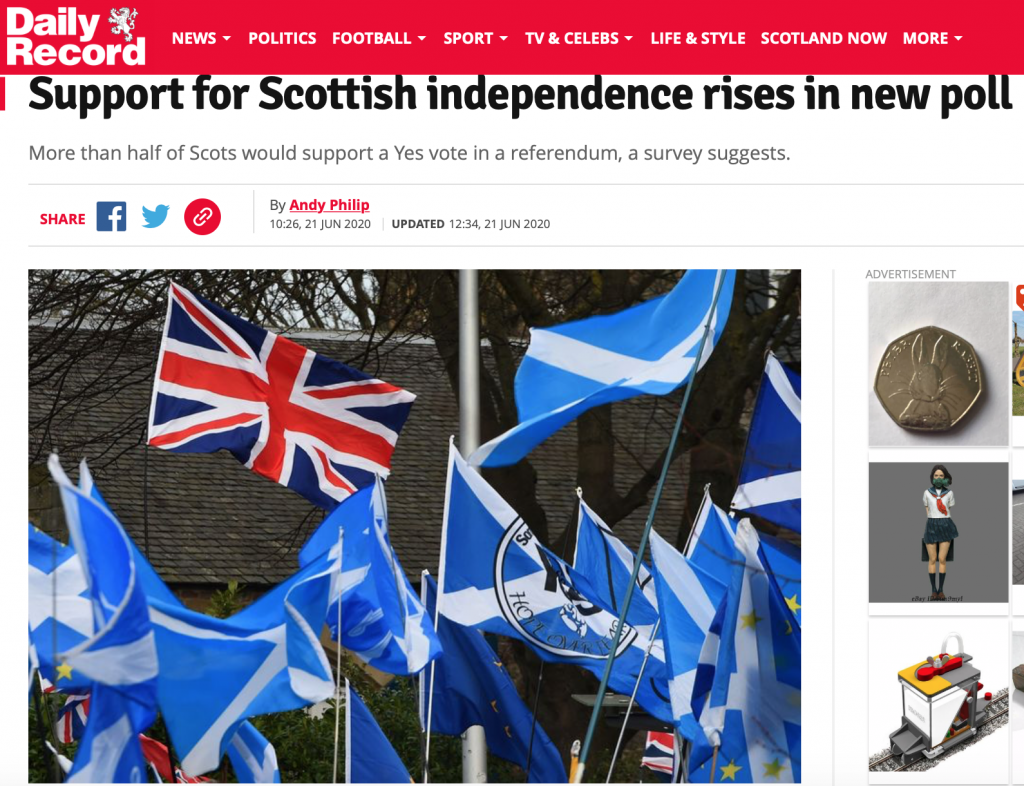
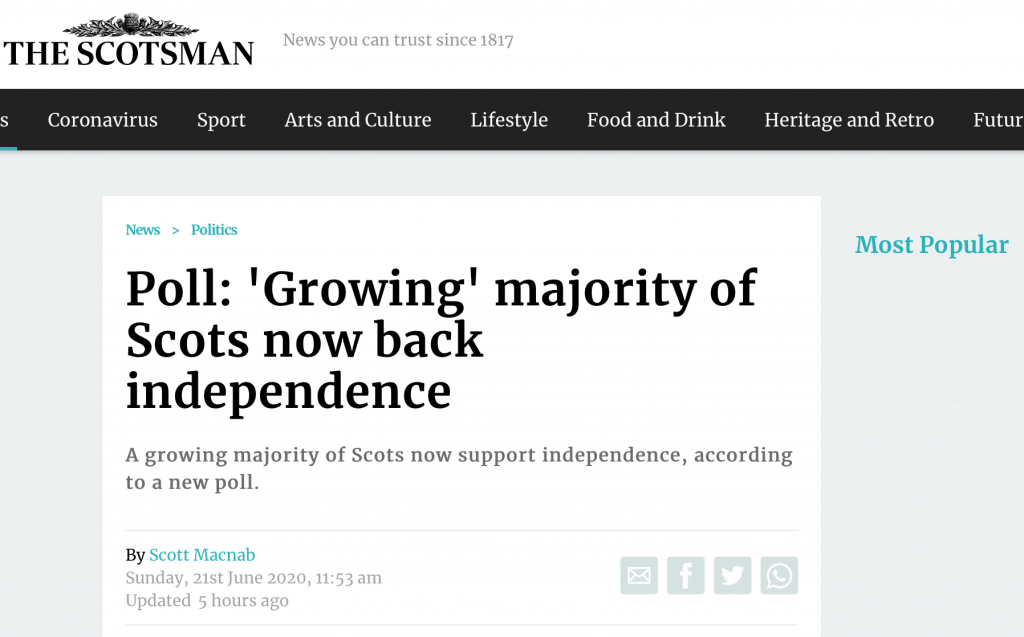






It’s the only sensible way forward , it then means the political parties in Scotland would be responsible to the Scottish public and do not get their orders from London as do Scottish Labour and for sure the Scottish Tories , then it is entirely possible that someday these parties could win an election if their focus was only on Scotland .
Excellent article – helps to see the movements beneath the surface of the headline Poll number. Unless people age into Unionism, Independence is coming – demographics are destiny.